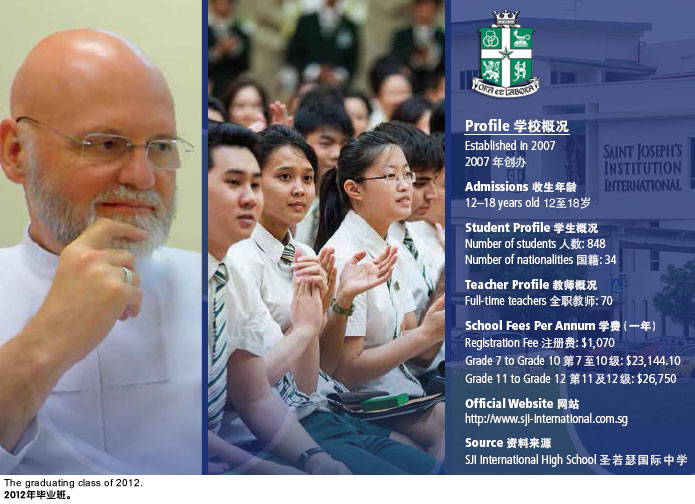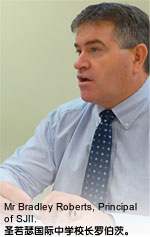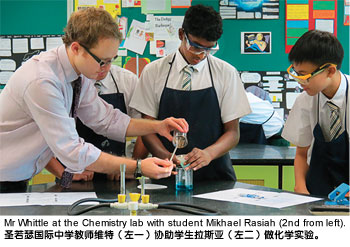|
St Joseph's Institution International High School wants to open its doors not only to the rich but to those who have potential, and each student will benefit from a child-centred education.

 Founded in 2007, St Joseph's Institution International (SJII) High School offers a values-driven international educational experience within the context of the Catholic faith and the local community. As a school under the purview of the La Salle Brothers who came to Singapore in 1852, SJII follows the Lasallian mission of promoting the well-being of the entire student, from spiritual to academic to social. Founded in 2007, St Joseph's Institution International (SJII) High School offers a values-driven international educational experience within the context of the Catholic faith and the local community. As a school under the purview of the La Salle Brothers who came to Singapore in 1852, SJII follows the Lasallian mission of promoting the well-being of the entire student, from spiritual to academic to social.
While the School may be charging international school fees, it strives to offer its brand of education to children with potential by running an extensive scholarship programme.
Apart from awarding scholarships for the two-year International Baccalaureate (IB) Diploma Programme to students who are academically bright, SJII also offers merit-means scholarships, which are reserved for children who come from homes with an annual income of less than $50,000.
Mr Bradley Roberts, Principal of SJII, said, "The aim that we're working towards next year is for 20 per cent of our IB cohort to be on scholarship. So with 175 students, we're working towards having 35 scholars each year. This will comprise about ten international scholars, and 25 Singaporean scholars. Amongst the Singaporean scholars, five scholarships will be purely merit-based, while the other 20 scholarships will be a combination of merit and means for students coming from homes where the annual income is less than $50,000.
SJII currently has 325 students enrolled in Grades 11 and 12, with 42 scholars amongst them.
Merit-means Scholarships
Brother George Van Grieken, Brother President of SJII, explained the rationale behind the scholarships, "one reason for the scholarship is simply because it's our mission and the La Salle Brothers' rule that we provide a human and Christian education to the young, especially the poor. And I always point out that it doesn't only include the poor, it means that there's a preference for the poor. This is a real, unrecognised value-added component."
 With international school fees, you attract people who can afford them, so I think we are aware that we don't want to become a school just for rich children. We want a school which is open and diverse and is open to all children, and our scholarship programme allows us to do that. It is one of the things that separates us from the other international schools in Singapore because of the size and focus of the scholarship programme. That's very important to us. We're trying to attract children with real potential and we hope what we're got in place works," Mr Roberts added. With international school fees, you attract people who can afford them, so I think we are aware that we don't want to become a school just for rich children. We want a school which is open and diverse and is open to all children, and our scholarship programme allows us to do that. It is one of the things that separates us from the other international schools in Singapore because of the size and focus of the scholarship programme. That's very important to us. We're trying to attract children with real potential and we hope what we're got in place works," Mr Roberts added.
Another reason for the scholarship is to ensure that the students in the School come from different economic backgrounds.
"With that kind of economic variety comes a sort of sub-cultural variety — the experiences different students bring with them as they go through education together. That's what I hear from the old boys of what is wonderful about SJI. When I had an occasion to speak with Deputy Prime Minister Teo Chee Hean, I asked him why is it that his batch still gets together every year, and he said, 'Well, you have to remember, we grew up together from Primary 1 all the way through, so we know each other much better than most people do and we're been friends for this entire time.' It doesn't matter what their job is — executives, taxi drivers, or politicians — when they get together, they're the same people. That's something we want to instil in every kind of education we provide, no matter the fact that we're providing kids great opportunities that they otherwise cannot get," Brother George said.
One challenge SJII has encountered in awarding the merit-means scholarship is the search for applicants who meet the criteria some donors set: that the scholarship goes to a student who comes from a family with an annual income of less than $50,000.
SJII has thus put in place an outreach programme to tell more students about the availability of such scholarships. Mr Roberts has already been in contact with principals from about 40 schools to identify children who could benefit from the scholarship. He will also be giving talks himself in schools and advertising the scholarship programme in the press.
In awarding these scholarships, SJII is also mindful of two things. First, potential scholars have to have the capacity to take full advantage of and benefit from the IB curriculum. Second, scholars have to be able to further secure scholarships to go on to university. Otherwise, the investment of time and energy will not provide the full benefits desired.
A Child-centred Education
What these scholars, along with the other pupils in SJII, benefit from is a child-centred education in which students are developed holistically. Students are actively involved in lessons, and are engaged in group work, presentations, discussions, independent research, and peer- and self-assessment. Furthermore, students in Grade 7 and Grade 8 take far fewer tests as compared to their peers in local schools. This sets them up for the IB curriculum, in which class-based assessments account for 25 per cent of the awarded grade.
In dealing with a child-centred philosophy, Brother George shared, there should be a respect for individual needs, and some students, of course, will have special educational needs. As a testament to the Lasallian values, SJII provides for such situations. The School employs suitable teachers, addresses the needs of these students in an appropriate manner and develops an individual education plan that best suits the child.
Outside of the classroom, students take part in community service and activities.
"From the time that a child walks through our doors in Grade 7 aged 13 to the time he or she leaves they are involved in community service. They start with a project-based approach, and from Grades 9 to 12, when they are aged 15 to 18, they need to be involved in a service activity every week. We also run 62 different types of activities, which range from scuba diving to the brass band, and we encourage students to do as many of these as possible. Everything we do goes back to our core values, which are based on the Lasallian and Catholic views of nurturing a child," Mr Roberts explained.
This can also be seen in the way SJII adds value to each student.
"One of the things I've been impressed with is that in our last IB batch and the previous one as well, there were significant examples of individuals who came in with low Primary School Leaving Examination (PSLE) scores, less than 200 but they got 39 or 40 in the IB. And it's not just one person. So we recognise that along the way, between Grade 7 and Grade 12, in the right kind of environment, the individual's motivation, capacity, interests and work ethic come into play to the extent that they end up doing very well," Brother George said.
While such examples may not be the norm, SJII can pride itself on its students getting an average of 36 out of a possible 45 points in the 2012 IB results.
Mr Roberts acknowledges that a key differentiator is the student's maturity.
"One of the realities is that a child at 12 and a child at 18 isn't the same, "said Mr Roberts. "So for some, a score of 178 for the PSLE isn't a true representation of their ability, it's a representation of where they were at 12 years old. For some of them, they undergo great changes in those six years between Grade 7 and Grade 12. Regardless of where they come from, the vast majority does very well and moves ahead."
Generally, the students who enter SJII, particularly those from local schools, have a good work ethic which leads to success. Students also thrive at SJII because of the curriculum, pedagogy, support structure and the options they have. For instance, they have the freedom to explore their areas of interest in the earlier years and are only required to choose the subjects they will take for the IB at the start of Grade 11.
"I know that the Singaporean system has gateways at various points and our system doesn't, which is a slight difference and for kids who are late bloomers, this is obviously good for them. But it is clear that our kids come in with an outstanding work ethic and they therefore work really hard," Mr Roberts said.
Beyond the Academic
But what the students do beyond getting good grades is equally important. Apart from community service, intangibles such as creativity, resilience, and having an interest in a wide variety of subjects are encouraged. As a result, SJII does not just take in academic stars but it also focuses on how a potential student can be developed to his or her fullest potential.
"Those are the sort of things we look for when we talk about our scholarship kids as well, and what we look for in children whose data shows they have got a low score academically. The child is going to add value because he or she will be very involved in extra-curricular activities. These are the types of students we will easily take into the School because they are going to come in and they are going to take full advantage of our programme, because academics is only a part of what we do,
Mr Roberts added.
Locals in an International School
While 59 per cent of students in Grade 7 this year are Singaporeans, the School plans to enrol an equal number of local and international students in 2014.
"Our Elementary School has been growing over the last couple of years, and as it matures, the percentage of international students coming from there into the High School grows.
"Many Singaporean parents are choosing to send their children to international schools, whether it's SJII, Hwa Chong International School or Anglo-Chinese School (International), because their children are going to experience growing up in an environment of students coming from different backgrounds. We've done very well as a new school, " Mr Roberts concluded.
|